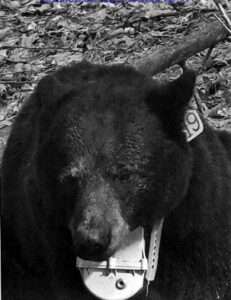The Volokh Conspiracy
Mostly law professors | Sometimes contrarian | Often libertarian | Always independent
An Un-Bearable Fourth Amendment/Property Rights Case
A Connecticut case raises the issue of whether a government agency violated the Fourth Amendment by attaching a camera to a bear known to frequent the plaintiffs' property. While the facts may seem silly, the case does raise some serious issues.

A case recently filed in a federal district court in Connecticut alleges that a state government agency violated the Fourth Amendment by attaching a camera to a bear they knew frequented the plaintiff property owners' land. Here is an excerpt from the complaint filed in Brault v. Connecticut Dept. of Energy and Environmental Protection:
6. During all times mentioned in this complaint, the defendant knew that bears, including a bear the defendant had tagged as Number 119, frequented the said property [belonging to the plaintiffs].
7. On an unknown date prior to May 20, 2023, but subsequent to January 1, 2023, the defendant affixed a collar to Bear Number 119 which contained a camera. The defendant thereupon released the camera-carrying bear in the vicinity of plaintiffs' property.
8. At approximately 9:30 a.m. on May 20, 2023, Bear Number 119 approached to within 200 yards of the plaintiffs' residence, which is located near the center of their property. It was wearing the aforesaid camera at the time and, upon information and belief, that camera was activated and taking and transmitting pictures or video of the interior of the plaintiffs' property to the defendant.
9. Upon information and belief, the defendant did not have a search warrant authorizing or permitting photographic surveillance of the interior of the property of the plaintiffs.
10. The aforesaid warrantless surveillance of the interior of plaintiffs' residential property is ongoing and inflicts irreparable injury on the plaintiffs in violation of the Fourth Amendment.
Accordingly, the Braults' ask the court to issue an injunction requiring the DEEP to stop attaching cameras to bears that wander on their land and to destroy all video evidence previously gathered by bear-camera surveillance on their land.
Like Nero the drug-sniffing dog, Bear No. 119 should have studied the relevant legal precedents more carefully! Had he done so, he might have been more careful, and this lawsuit could have been avoided. Or maybe he should have spent more time in hibernation.
At the Inverse Condemnation blog, property law specialist Robert Thomas notes that the case is relevant to the increasingly influential "property theory" of the Fourth Amendment, which holds that violations occur when the government engages in surveillance or searches that violate established property rights.
I'm no Fourth Amendment expert, so cannot say how this case should ultimately be resolved. But to the extent that property law is relevant, I think it pretty clear that the state Department of Energy and Environmental Protection intruded on the Braults' property rights.
If the agency had placed a camera on the Braults' land (without their consent) some other way (e.g. - by dropping it from a helicopter flying overhead), it would surely have been a trespass. Using a bear (or other wild animal) to get the camera onto the property instead of a helicopter doesn't change the relevant legal analysis. Or so, at least, it seems to me, as a longtime property law scholar.
Perhaps things would be different if DEEP didn't intend or have any reason to expect that the camera-bearing bear would go on the plaintiffs' land. But the Braults' complaint says the agency did in fact know that Bear No. 119 "frequented the said property."
Why are the Braults so adamant in seeking to end the bear-facilitated surveillance? In addition to the violation of their privacy, it may be because, as an attached affidavit by Mark Brault indicates, he is being sued by the Town of Hartland for allegedly feeding bears on his land illegally. While he denies this allegation, perhaps Bear No. 119 secured video footage of Mr. Brault illicitly feeding him (or some other bear).
The specific facts of this case may seem a bit silly - perhaps even unbearably so. But there is a broader issue here. Modern technology makes it possible for government agencies to attach surveillance devices to a wide range of wild animals, and then release the animal on or near the property of someone they want to collect evidence against, or perhaps even just harass. If courts rule that such activities don't violate the Fourth Amendment, it could open the door to abuses of power much more serious than the misadventures of Bear No. 119. Grr!
UPDATE: Reason's Jacob Sullum has a detailed discussion of this case and its implications here.


Show Comments (36)